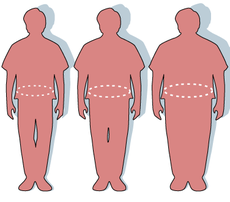ACP Issues Guidelines for Diagnostic Imaging for Low Back Pain
Posted by: admin on: July 11, 2011
- Routine imaging for low back pain with radiography or advanced imaging methods, such as computed tomography (CT) scanning or magnetic resonance imaging (MRI), does not improve patient health, according to recommendations issued by the Clinical Guidelines Committee of the American College of Physicians (ACP) regarding high-value healthcare for diagnostic imaging for low back pain.
- The new guidelines, which are first in a series to help physicians and patients identify misused medical treatments and to practice high-value healthcare, are published in the February 1 issue of Annals of Internal Medicine.
- The recommendations target internists, family physicians, and other clinicians treating adults with low back pain.
Low back pain is one of the most common reasons for a patient to see a physician and many patients with low back pain receive routine imaging that is not beneficial and may even be harmful, according to Amir Qaseem, MD, PhD, MHA, director of clinical policy for ACP.
Unnecessary imaging can lead to a series of unnecessary additional tests, interventions, follow ups, and referrals that do not improve patient outcomes.
The new recommendations are based on a systematic review and meta-analysis conducted for the diagnosis and treatment of low back pain joint clinical practice guideline from ACP and the American Pain Society.
Asking a doctor for their opinion on another physician
Posted by: admin on: July 11, 2011
- Incompetence in a physician is a scary thing! Doctors deal with problems of life and death and try to heal you with dangerous tools. But how do you know who’s on their game and who’s falling down on the job? It’s tricky for patients because they often don’t know enough about medicine practice to judge competency. This makes putting your body under the care of any doctor scary.
- So scary, in fact, that an entire malpractice industry has sprung up to reassure patients that incompetent doctors will be severely punished. Unfortunately malpractice usually ends up a witch hunt that can burn good doctors at the stake and let bad ones go
- Judge not, lest you be judged Read the rest of this entry »
Helping Kids: What the USDA Guidelines Offer for Pediatrics
Posted by: admin on: July 8, 2011
- By law, the US Department of Agriculture (USDA) Dietary Guidelines for Americans are reviewed and updated every 5 years to keep our health moving forward. The new guidelines, Dietary Guidelines for America, are different from previous versions in several ways.
- They are addressing a nation where most are undernourished when it comes to several key nutrients.
- The childhood obesity epidemic has taken center stage, putting pediatricians and family practitioners on the frontlines of one of the nation’s most pressing health concerns.
- The guidelines are evidence based and rely on a new online state-of-the-art evidence library to get the best answers to scientific questions.
- They end in a very hopeful way by saying that in 2015, when we reconvene, we expect that America’s health and nutrition will have moved forward.
- The 2005 guidelines ended with similar hope but didn’t get very far. The problem is that there’s a big disconnect between that goal of the dietary guidelines and the actual behavior of Americans. Read the rest of this entry »
Febrile Convulsion- The Royal Children’s Hospital, Melbourne
Posted by: admin on: July 8, 2011
- A simple febrile convulsion is a brief (< 10 min duration) generalized convulsion in a febrile (> 38oC) child aged between 6 months and 6 years, with no previous afebrile seizures, no progressive neurological condition and no signs of a CNS infection.
- Management of the convulsion
This is described in detail in the Convulsions guidelines. Read the rest of this entry »
Too Few Doctors Tell Patients they’re Overweight
Posted by: admin on: July 8, 2011
http://en.wikipedia.org/wiki/Obesity
- Many people who are overweight and obese either don’t realize it or are in denial — and too few doctors are setting them straight, according to a new study in the Archives of Internal Medicine.
- Researchers analyzed data on roughly 5,500 people who took part in government health surveys between 2005 and 2008. One-third of the obese participants and 55 percent of overweight participants had never been told by a doctor that they were overweight, the study found. Read the rest of this entry »
Search
- drchasrani: Difficult to get such a data, authenticated at that. Try Times of India online library
- rakesh pore: hi, where can i get genuine information about "10 most common drugs sold in india?" i want it for a local project
- nilesh dutta: sir, Plz give detail about MBA Sports Management Thanks and Regards


